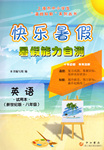题目内容
_____ English learners, we should not only be able to understand the meanings expressed by the language itself but also ______ expressed by postures, gestures and facial expressions.
A. Like; that B. As; those C. Like; those D. As; that
B

练习册系列答案
 快乐暑假暑假能力自测中西书局系列答案
快乐暑假暑假能力自测中西书局系列答案
相关题目




